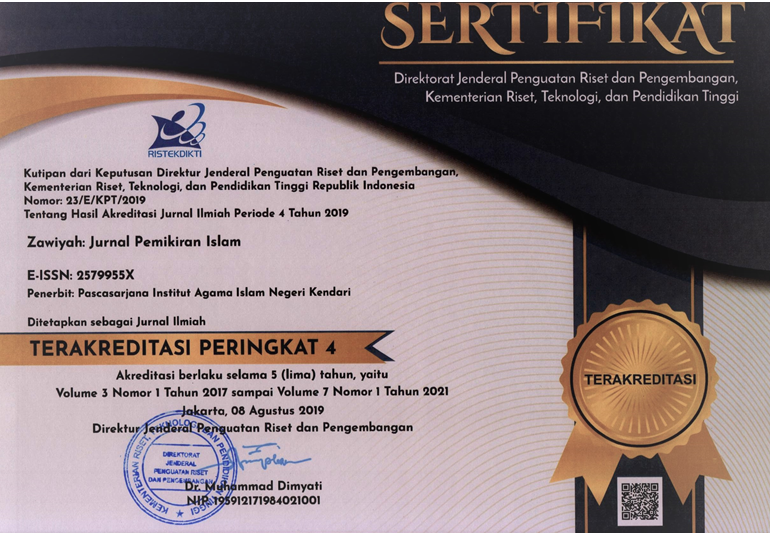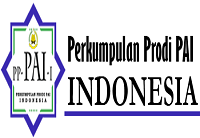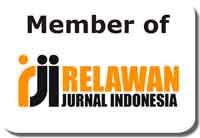IBN KHALDUN AND ANTHROPOLOGY: THE FAILURE OF METHODOLOGY IN THE POST 9/11 WORLD BY AKBAR S. AHMED
Abstract
Pandangan Barat tentang dunia Islam telah berubah dan oktrin Islam dibenarkan oleh kekerasan, intoleransi, terorisme dan ancaman terhadap masyarakat Barat dan dunia global. Hal ini terjadi setelah peristiwa pengeboman WTC pada 11 Maret 2001. Makna Islam berubah dari mengajarkan prinsip-prinsip perdamaian menjadi teologi kekerasan, dan Islam dipandang sebagai monolitik, parsial, dan tidak lengkap. Hal ini juga dijelaskan oleh “Islamofobia” sebagai tanda perubahan citra Islam di Barat. yang mengganggu kehidupan umat Islam. Akbar S. Ahmed mengkaji masalah tersebut secara “historis-empiris”. Studinya bukan tentang teologi kekerasan, tetapi tentang cara berpikir untuk mengkritisi titik tolak sejarah pembangunan modern, sistem pendidikan Islam dan perkembangan studi Islam terkait dengan kehidupan sosial-keagamaan negara-negara Arab. Tanggapan Islam terhadap kemajuan Barat mengikuti tanggapan elit terhadap semua.penelitian ini penting untuk dilakukan karena dapat memberikan pemahaman lebih mengenai kejadian metodologi pasca 9/11 sesuai tanggapan dari Ibnu Khaldun dan antropologi dimana menjelaskan bagaimana kembalinya antropologi asabiyyah lalu reverensi dari ibnu khaldun serta runtuhnya kohesi sosial
Kata kunci: Ibnu Khaldun, Kegagalan Metodologi, Pasca 9/11, Antropologi, Asabiyya.
Abstract
The Western view of the Islamic world has changed, and Islamic doctrine is justified by violence, intolerance, terrorism, and threats to Western society and the global world. This happened after the WTC bombing on March 11, 2001. The meaning of Islam changed from teaching principles of peace to a theology of violence, and Islam was seen as monolithic, partial and incomplete. This is also explained by "Islamophobia" as a sign of the changing image of Islam in the West, which disrupts the lives of Muslims. Akbar S. Ahmed examines the problem in a "historical- empirical" manner. His study is not about the theology of violence, but about a way of thinking to criticize the historical starting point of modern development, the Islamic education system and the development of Islamic studies in relation to the socio-religious life of Arab countries. Islam's response to Western progress followed the elite's response to all. This research is important because it can provide a better understanding of the events of the post-9/11 methodology according to Ibn Khaldun’s response and anthropology, which explains how the return of anthropology asabiyyah then reverses from ibnu khaldun and the collapse of social cohesion.
Keywords: Ibn Khaldun, Methodological Failure, Post 9/11, Anthropology, AsabiyyaFull Text:
PDFReferences
Abdullah, M. A. (1996). Studi Islam: Normativitas atau Historisitas. Yogyakarta: Pustaka Pelajar.
Adiwarman, K. A. (2008). Sejarah Pemikiran Ekonomi Islam (3 ed.). Jakarta: PT. Raja Grafindo.
Ahmed, A. S. (1993). Postmoderism and islam: Predicament and Promise. (M. Sirozi, Trans.) Bandung: Mizan.
Ahmed, A. S. (n.d.). Ibn Khaldun and Anthropology: The Failure of Methodology in the Post 9/11 World". Contemporary Sociology, 34, 591-596.
Ahmed, A. S., & David, H. (1984). Islam dalam Masyarakat Kesukuan: Dari Atlas ke Indus. London: Routledge.
Ali, M. D. (1998). Kedudukan dan Pelaksanaan Hukum Islam dalam Negara Republik Indonesia. In C. H. Bisri, Hukum Islam dalam Tatanan Masyarakat Indonesia (pp. 1-24). Jakarta: Logos.
Budiarti. (2017). Konstruksi Penemuan Hukum Melalui Ijtihad (Vol. I). (Z. Musthafa, Ed.) Makassar: Yayasan Pendidikan Tompongpatu.
Derani, Saidun. (2018). “Metode Sejarah Ibn Khaldun.” Buletin Al-Turas. https://doi.org/10.15408/bat.v17i1.4291.
Khaldun, I. (1981). Muqaddimah. 18.
Khaldun, I., & Rosenthal, F. (1969). Muqadimah: Sebuah Pengantar Sejarah. Princeton NJ: Princeton Univercity Press.
Nata, A. (2011). Metodologi Studi Islam. Jakarta: PT. Raja Grapindo Persada.
Pulungan, S. (1997). Fiqh Siyasah: Ajaran, Sejarah dan Pemikiran. Jakarta: Raja Grafindo Persada.
Simon, & Shedon, W. (2002, July). Southeast Asia and The War on Terrorism. D.C:The National Bureau of Asian Research, 13.
Wahyuni, I. (2016). Integrasi Sains dalam Materi Pembelajaran Bahasa Arab pada Perguruan Tinggi Keagamaan Islam. Zawiyah: Jurnal Pemikiran Islam, 2(1).
DOI: http://dx.doi.org/10.31332/zjpi.v9i2.6776
Refbacks
- There are currently no refbacks.
Copyright (c) 2023 Zawiyah: Jurnal Pemikiran Islam

This work is licensed under a Creative Commons Attribution-ShareAlike 4.0 International License.
View My Stats













